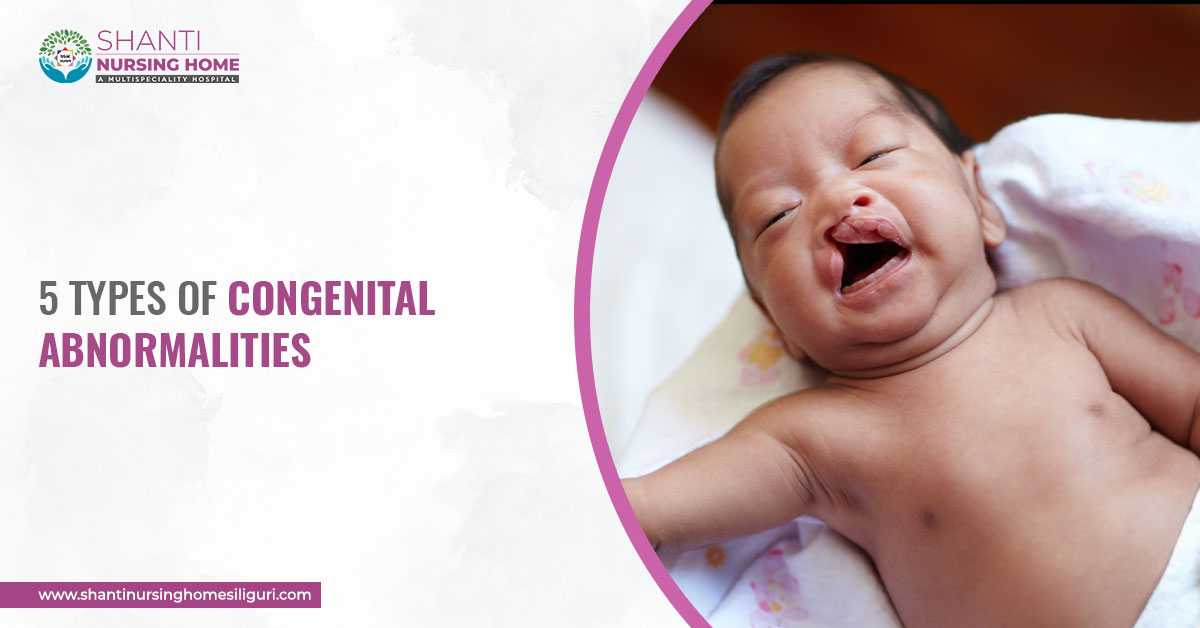Congenital abnormalities are also known as birth defects or congenital malformations. It is a type of disorder that causes functional or structural anomalies among babies that can be identified during infancy, at birth, or prenatally. Maternal infections, nutritional status, diseases, genetic history, or other physical factors can lead to certain birth defects.
You must consult a gynecologist in Siliguri immediately if you’re pregnant since the doctor will help in doing genetic screenings and prenatal ultrasounds. These tests and proper prenatal care will help in ensuring that the fetus is not predisposed to any heart-related, spinal, reproductive system, or chromosomal abnormalities.

Here are some of the common congenital abnormalities.
1. Hypospadias
Hypospadias is a birth defect that is experienced by boys, where the urethra opening is not situated at the tip of the penis. There are different types of Hypospadias such as subcoronal, penoscrotal, and midshaft.
The risk of baby boys born with Hypospadias increases if the mother has conceived through fertility treatments. Certain hormone medications, age, and weight of the mother can also lead to Hypospadias. In most cases, surgery is required to correct the defects in the urethra.
2. Congenital heart defects (CHD)
CHD is a structural abnormality in the baby that can either be simple or complex. The complex defects in the heart may need several surgeries to correct. Atrial septal defect (ASD), bicuspid aortic valve, and atrioventricular canal defect are some of the common types of CHD.
Some of the symptoms of this defect that can be noticed in the infant are swelling of legs, pale lips and fingernails, shortness of breath, and rapid breathing. Drinking alcohol or smoking during pregnancy, diabetes, and family history can increase the risks of CHD.
3. Down syndrome
Down syndrome is a common genetic disorder and a birth defect that is caused due to the presence of extra genetic material. This health condition can lead to learning or intellectual disability or developmental delays among babies.
A small head, flattened face, small ears, short neck, excessive flexibility, and short height are some of the common symptoms of Down syndrome. You must visit a gynecologist hospital in Siliguri for prenatal screening since this disorder mostly occurs during the early development phase of the fetus.
4. Clubfoot
Clubfoot is a congenital foot abnormality in which a baby’s foot is either twisted out of position or shape. This birth defect can be caused due to certain environmental or genetic factors.
Smoking during pregnancy, family history, and lack of amniotic fluid can increase the chances of this disorder. Based on the seriousness of the defect, the doctor may recommend surgery or stretching as treatment options.

5. Ventricular septal defect (VSD)
VSD is a congenital heart defect that leads to a hole in the heart mainly in the wall that separates the ventricles of the heart. Due to the hole, the oxygen-rich and oxygen-poor blood gets mixed causing higher blood pressure in the lungs.
Slow physical growth, poor eating, easily tiredness, whooshing sound in the heart, and breathlessness are some of the prominent signs of VSD. A family history of heart defects and premature birth can increase the risks of developing VSD.
You must always consider the fact that contacting a gynecologist in Siliguri during pregnancy and constantly monitoring the development of the fetus is extremely essential for reducing birth defects. You can also take daily multivitamins, maintain body weight and take care of other medical complications for decreasing the risks.





